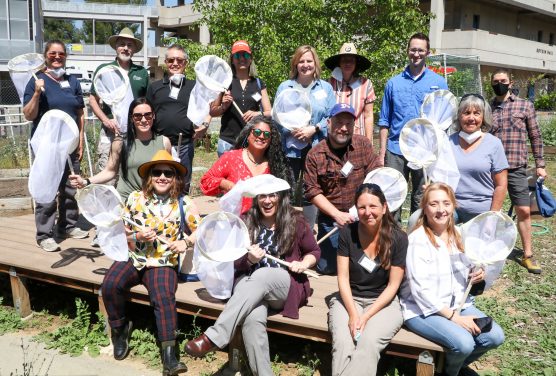Something new is abuzz at College of the Canyons. From April 1-2, the COC Biodiversity Initiative hosted 15 visiting faculty members from 10 community colleges to kickstart the college’s Campus as a Living Lab initiative with a native bee identification workshop funded by the National Science Foundation.
“Native bees are a critical source of global natural capital, which is currently under threat from multiple sources including, but not limited to, land use changes, pesticides and climate change,” said COC Biology Instructor Jeannie Chari, who spearheaded the event with Jaime Pawelek from the Essig Musuem of Entomology at UC Berkeley and Dr. Patricia Palavecino from Antelope Valley College.
The additional visiting faculty members were:
Scott Peat and Kimberly Newton, Bakersfield College
Alicia Fox, Hancock College
Brian Swartz, Moorpark College
Darcie McClelland, El Camino College
Melissa Carrillo-Galaviz, Estrella Mountain College, Arizona
Michelle Smith, Solano College
Paul Ustach, Delta College
Brian Gillespie, Woodland Community College
Guck Ooi and Claudia Sellers, Cerro Coso Community College
Erum Syed, Coastline Community, College
In 2021, COC received a $74,707 grant from the National Science Foundation to provide opportunities for underrepresented community college students to engage in undergraduate research focusing on native bees.
To that end, the two-day workshop provided a comprehensive approach to native bee identification and taught attendees about bee families, pinning practices, and data input.
Visiting faculty members also received a training toolkit to implement on their respective campuses.
Using the campus landscape as a living lab, faculty and students will research native bee biodiversity with the intent to enrich campus habitats, foster increased biodiversity of native bee species and address the current rapid loss of biodiversity affecting ecosystem stability and pollination services.
“This will create a rare and wonderful opportunity for students to get undergraduate research experience at the community college level,” said Chari.
The collected research data will be shared among the participating network institutions through public databases.
The project’s goal is to create a strong foundation for establishing a sizeable future network of colleges that can use the available data to foster ongoing critical pollinator research opportunities for underrepresented students.
“We hope our collaborative efforts can help increase campus native bee species numbers through habitat enrichment on participating college campuses,” said Chari.
Like this:
Like Loading...
Related





 Tweet This
Tweet This Facebook
Facebook Digg This
Digg This Bookmark
Bookmark Stumble
Stumble RSS
RSS
































REAL NAMES ONLY: All posters must use their real individual or business name. This applies equally to Twitter account holders who use a nickname.
0 Comments
You can be the first one to leave a comment.